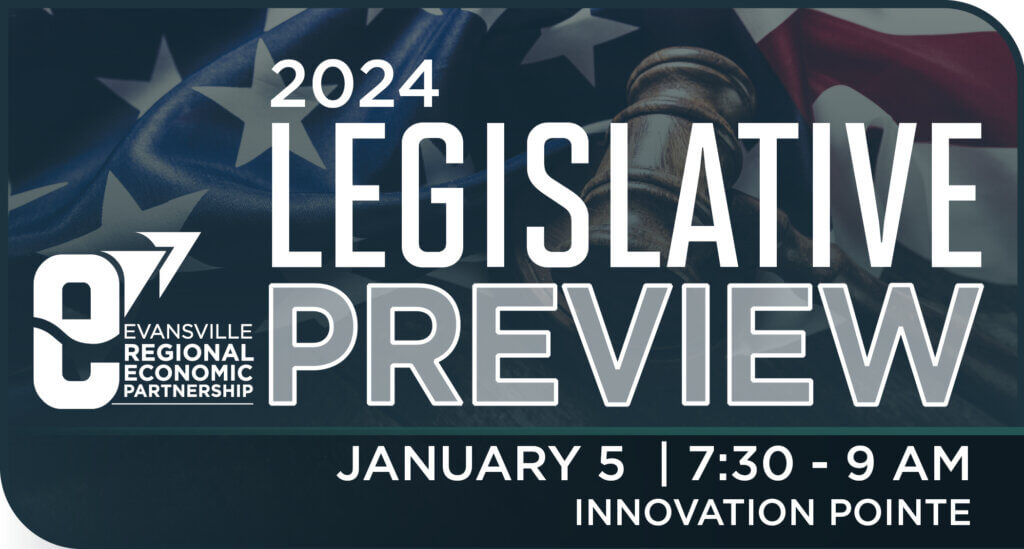
Indiana Chamber of Commerce President and CEO Kevin Brinegar bid adieu one last time as he emceed his 22nd and final legislative preview on Monday. He will officially step down January 5th, following a protracted departure after more than 30 years with the organization and 20 years at the helm of the state’s largest business organization. His successor, Vanessa Green Sinders, the first female IN Chamber CEO was introduced, “I am just ending my first month in transition,” said Sinders, “I am meeting as many people as possible, listening and learning across the state. If we haven’t met yet, know that you are on my list.”
Sinders highlighted the recently released Indiana Prosperity 2035 report saying, “Now is the time to operationalize and implement the big six pillars in 2024 and beyond.” Those six pillars include: Workforce, Education, Economic Growth, Infrastructure and Energy, Quality of Place, and the Health and Prosperity of our Workforce and Communities. The perennial topics of workforce talent pipeline, PreK, more business startups, broadband, sustainable and renewable energy, quality of place, affordable housing and public health were also discussed.
Each of the Chamber lobbyists shared the issues they would be working on during the upcoming short legislative session. Adam Berry will be focused on tort reform, better aligning state and local XBE certification processes, and making Indiana the 20th state to establish driving privilege cards for undocumented residents. Jason Bearce’s education work will focus on PreK and childcare; college & career readiness; and access to work-based learning opportunities created in HEA1002 from the last session.
Greg Ellis expects a light session for environmental issues with action to revise the definition of PFAS and PFOA along with plans for a new Chamber statewide comprehensive water study that will be complete late spring or early summer. Ashton Eller communicated the Chamber’s “continued concern” regarding healthcare costs and a goal to increase the Medicaid reimbursement rate, which might ease cost pressures on commercial payers currently offsetting the shortfalls. As a way to help pay, the Chamber (again) proposes a $2/pack cigarette tax increase. “Employers pay $6B – with a B – annually in healthcare costs associated with tobacco.” Eller also called for tweaks to “scope of practice” laws to improve access to healthcare, with specific impacts on APN’s, PA’s and pharmacists. Additionally, Eller applauded the work the General Assembly did last session to address public health and mental health in Indiana and urged an attempt to “build on that” as the economic burden on hoosier businesses is estimated at over $4B/year and 1 in 5 Hoosiers still do not receive the help they so desperately need. Finally, Eller shared the Chamber’s continued opposition to union-only project labor agreements in the state, insisting “all qualified contractors” be permitted to bid on projects.
Last but not least, David Ober reinforced the Chamber’s support for continued business personal property tax reform and announced the Indiana Chamber sponsored Ernst and Young analysis of Indiana’s tax system which will model the impact of reforms on the state economy and business called Redesigning Indiana’s Tax System, with initial data expected in by early January 2024.
After the Chamber shared their priorities, the four caucus leaders took the stage to give a sneak peek of the session and share their priorities. Between that time on stage and speeches given on Tuesday’s Organization Day, we have a good understanding of what to expect. House Speaker Todd Huston (R-Fishers) spoke first hoping to “manage expectations for this session.” He continued, “We’ve done a lot and we need to see things be implemented. We are going to see fewer agenda bills this year with a ‘less is more approach’.” During the Q&A session, Senate President Pro Tem Rod Bray (R-Martinsville) reiterated the focused approach for legislation largely limited to “cleanup and tweaking” of past legislation rather than any new initiatives, sharing plans to limit the number of bills individual senators can file to 5 this session.
Senate Minority Leader Greg Taylor (D-Marion) said he hoped to “keep social issues out of the legislative process” with his Democratic caucus focusing on “Families, Freedom and Future.” Taylor and his colleague in the House, Minority Leader Phil Giaquinta (D-Ft Wayne) called for ballot initiatives to be allowed in the state “like the citizens in Ohio” – clearly a nod to the recent passage of abortion protections by Ohioans in November. From the Senate floor on Tuesday, Taylor added, “Studies show that 60% of Hoosiers support reproductive rights, and 80% support cannabis in some form. What does that say about us that we don’t want to hear from Hoosiers? The fear of the supermajority is that if we let Hoosiers vote on these issues, it might not be the same as our caucus.”.
Across the GOP leadership in the House and Senate there seems to be alignment on ensuring reading proficiency by Grade 3 taking aim at the practice of social promotion of 3rd graders who cannot read, “We are reading worse than decades ago,” said Huston. Queries about a potential backlash from parents and educators and an anticipated bottleneck if 20% of kids are retained at the 3rd grade, drew a sharp reply from the Speaker, “We need to focus on the kids this is impacting now, not how this will impact the budget. If it costs us more money, it’s going to cost us more money. Parents need to appreciate and value education. Schools will have to staff differently. And we hope prosecutors take a more aggressive tone in addressing educational neglect,” said Huston.
Other issues shared across the GOP leaders include increasing access and affordability of childcare, and continued work regarding healthcare costs. We also expect some attention to antisemitic actions on college campuses with a reintroduction of last year’s HB1037, tweaks to last year’s HEA1002 regarding HS students to gain workforce experiences, initial plans to widen both I-65 and I-70 to 3 lanes border to border, and attention to the state’s water resources that has drawn attention with the LEAP District planned for Northwest of Indianapolis.
There will be many more bills introduced and debated between January 8th and March 14th. We will continue to take deeper dives into specific issues over the next few weeks as we prepare for the Session to kick off in January.
